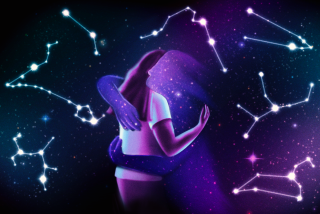Scientists Horrified So Many Believe Horoscopes
- Share via
CHICAGO — More than one-third of American adults believe astrology has some scientific merit. Nearly one in seven regularly reads horoscope columns.
These numbers, reported in recent studies, sent eyes rolling heavenward at a session on astrology and other pseudoscience at the annual meeting of the American Assn. for the Advancement of Science here.
“Astrology, like alchemy, may have at one time reflected the scientific inquiry of its time, but has long since departed from the scientific mainstream into a commercial pseudoscience,” says Jon D. Miller, vice president of the Chicago Academy of Sciences.
Webster’s dictionary defines astrology as “a pseudoscience based on the notion that the positions of the moon, sun and stars affect human affairs and that one can foretell the future by studying the stars, etc.”
John Durant, assistant director of the London Science Museum, came away from the session convinced that “for those of us concerned with public understanding of science, it’s just important to let people know that they may be buying a rather false bill of goods.”
Who’s buying? Statistics show that a lot more women than men in England, France and the United States take seriously their horoscope, a daily forecast based on the position of the planets.
Why? One possible reason is that “women in our societies generally have less control over their own social, occupational and family future than men do, and this situation generates greater feelings of insecurity,” says Daniel Boy of the University of Paris.
“Belief in astrology would serve to reduce this insecurity symbolically by offering predictions and readings of the women’s personal destinies,” Boy adds.
In the United States, this gender orientation is reflected in Horoscope magazine’s 180,000 readers, more than 80% of whom are female. “Women in general tend to embrace these kinds of philosophical, psychological self-help tools and methods more than men,” says Editor-in-Chief Ronnie Grishman.
A surprising number of people with strong religious beliefs are also attracted to astrology, but many of them aren’t affiliated with traditional denominations, studies have found.
Many astrology enthusiasts ponder their destinies in horoscope columns published in almost 1,400 daily newspapers. Critics argue that the starry advice should appear on comics or entertainment pages and carry warnings that it shouldn’t be taken seriously.
Despite the caveats some newspapers carry, Miller has found that as many as 8 million Americans let their horoscopes influence some decisions, especially on travel. “If people who don’t like to fly anyway can get any kind of encouragement at all to stay home, an astrology column can be very helpful,” he says.
“Newspaper disclaimers haven’t done much to dissuade people from becoming interested in astrology,” says Robert W. Cooper, executive secretary of American Federation of Astrologers, based in Tempe, Ariz. The organization, which claims to have 5,000 members worldwide and affiliates in 40 countries, emphasizes astrology education programs.
“We don’t profess to be fortunetellers,” says Cooper. “The professional astrologer is supposed to give you a look at what you are, how you are, and give you some potentials. The difference between our science and a lot of others is that we have many variables and few fixed conditions.”
Some of the fixed conditions hark back to earliest recorded time, when astrologers ascribed mystical qualities to the planets, the moon and the sun, teaching that they affected the destinies of nations and kings.
With the intellectual ferment of the Renaissance, astrology suffered a setback as the Western world turned to scientific study of nature and the universe. But astrology has long since recaptured the attention of millions worldwide.
Cooper is convinced that “a trend toward specialization and new computer programs giving more people access to astrology will make the ancient practice even more popular.
“Today, instead of just sending someone to any astrologer, we ask about their interest. More and more of our members are becoming specialists instead of general practitioners. Some concentrate on financial matters, marital problems and career moves, or even help in drug-related problems.”






